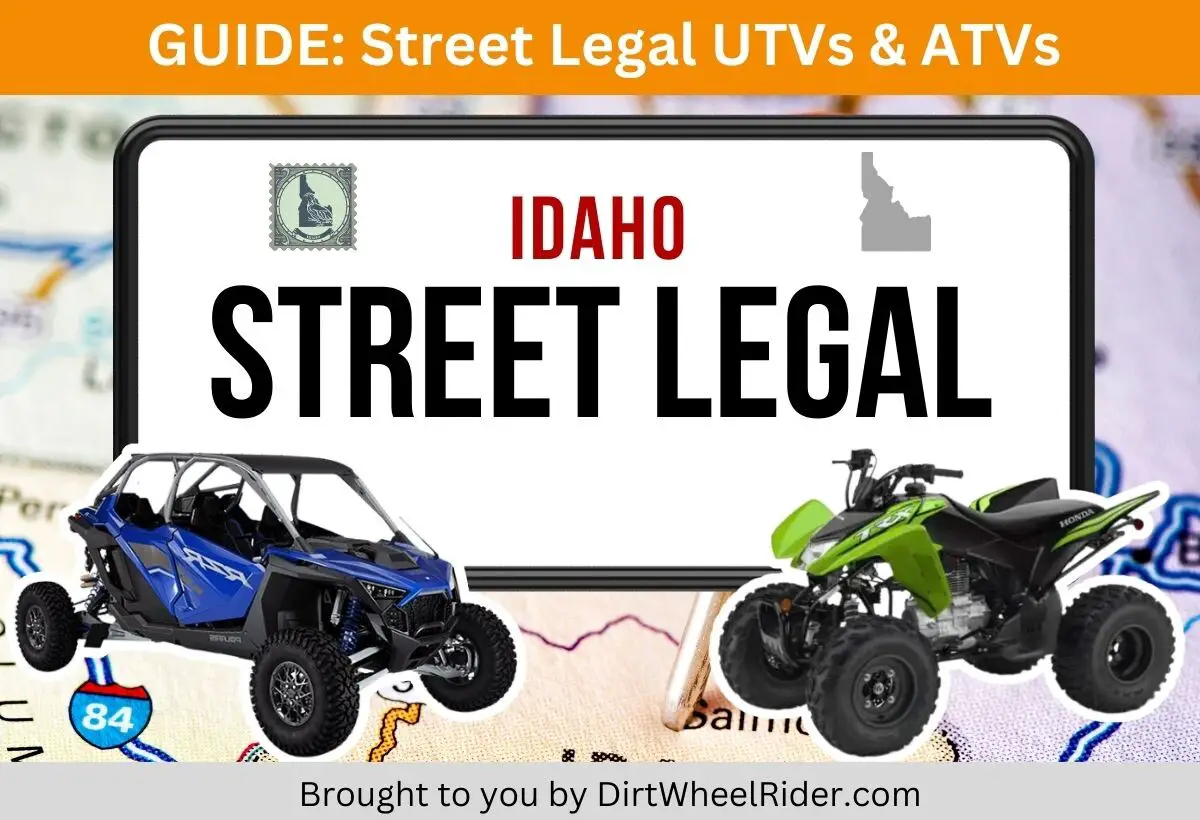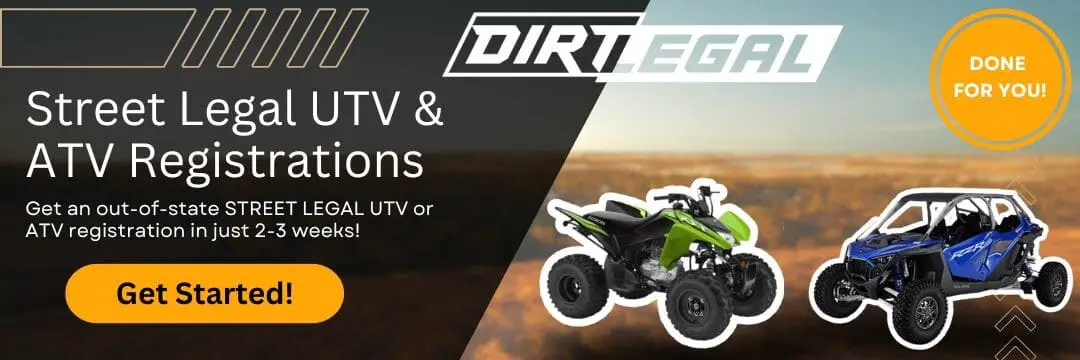Table of Contents
In this article, we will explore the street-legal law on ATVs and UTVs in the state of Idaho. If you are interested to know whether you can take your off-road vehicles to Idaho’s public roads, you’ve come to the right place as we aim to shed light on some of the most important questions you may have.
- Is there any law in Idaho that allows for ATVs or UTVs to be street legal?
- How does Idaho’s law formally classify an ATV or UTV?
- Can an ATV or UTV be street-legal in Idaho?
- What are the requirements to make an ATV or UTV street-legal?
- What are the operational and safety requirements when driving a street-legal ATV or UTV in Idaho?
- Where can I drive my street-legal ATV or UTV in Idaho?
- I am not a resident of Idaho; can I still register my vehicle in this state?
Idaho Legal Classification of ATVs and UTVs
In the state of Idaho, the classification of ATVs and UTVs as off-highway vehicles (OHVs) is outlined in the Idaho Code. According to the code, ATVs, or “all-terrain vehicles,” are recreational motor vehicles designed for off-road travel. They typically have three or more tires, a width of 55 inches or less, a wheelbase of 61 inches or less, handlebar steering, and a seat meant to be straddled by the operator.
UTVs, also known as “utility type vehicles” or recreational off-highway vehicles (ROVs), are defined as recreational motor vehicles other than ATVs, motorcycles, or snowmobiles. These vehicles are designed for travel over designated roads and feature four or more tires. UTVs have a maximum width of less than 80 inches and a minimum width of 50 inches, with a minimum weight of at least 900 pounds. It’s important to note that certain vehicles like golf carts, disability-specific vehicles, and implements of husbandry are not included in these definitions.
What sets Idaho apart is its recognition of these vehicles’ operation within the state. While many other states limit off-highway vehicles to trails and do not permit them on public roads, Idaho requires the registration of all ATVs, UTVs, and off-highway vehicles, regardless of whether the operator is a resident or non-resident.
Can an ATV or UTV be street-legal in Idaho?
Yes! An ATV or UTV can be street-legal in the state of Idaho as provided by the Idaho Code. If an ATV or UTV will be operated on city, county or highway district roads or highways open to such use, the ATV or UTV must be registered to have a restricted vehicle license plate.
OHVs: What are the requirements to make an ATV or UTV or OHVs street-legal in Idaho?
To make your ATVs or UTVs or OHVs street-legal in Idaho, you must fulfill specific requirements, which can be divided into two categories: paperwork and parts. Unlike other states that allow for street-legal registration of ATVs and UTVs, the state of Idaho does not have as many requirements in terms of vehicle parts. In fact, a few of the pieces of equipment we will list below are not required but are rather recommended.
1. Paperwork:
- Title
- IDPR OHV Certificate of Number Sticker
- Restricted Vehicle License Plate
- Liability Insurance
2. Parts
Required:
- Muffler
- Spark arrestor
Recommended but not required by law:
- Brake light
- Headlight
- Taillight
- Horn that must be audible at 200 feet
- Mirror showing roadway 200 feet behind the vehicle
What are the operational and safety requirements when driving a street-legal ATV or UTV in Idaho?
When driving an ATV or UTV on public roads in Idaho, you are required to adhere to the following operational and safety requirements:
- Driver’s license – operators under the age of 16 must be supervised by a license adult operator
- Liability insurance or alternative insurance
- Helmet – operators or passengers under 18 must wear a DOT-approved helmet
- Eye protection – this is required for vehicles without a windshield
- Vehicle capacity – unless the vehicle is designed for more than one rider or another seat has been firmly attached to the rear or side, the operator may not carry a passenger.
Where can I drive my street-legal ATV, UTV or OHV in Idaho?
Generally, street-legal ATVs and UTVs may be driven on all highways in Idaho except on state highways and interstate highways. Additionally, the Idaho Code also provides guidance on where these street-legal ATVs and UTVs with a restricted vehicle license plate may be operated on.
An ATV or UTV with a restricted vehicle license plate may be operated on:
- any non-full-access-controlled state highway within a municipality’s limits and for one mile outside of those limits, if the stated speed limit is 65 mph or less; and
- any non-full access-controlled state highway outside of municipalities where the posted speed limit is sixty (60) miles per hour or less for continuous distances of no more than five (5) miles to connect OHV trails, get to or from an OHV trail, or get to services like fuel, lodging, food and drink, and maintenance.
It is also important to note that off-highway vehicles that are driven on highways can’t go faster than the posted speed limit or 45 miles per hour, whichever is lower.
While these regulations are outlined in the Idaho Code, you must always check ahead with the local authorities in the county/counties you wish to operate your vehicle on as local jurisdictions may set additional restrictions on which streets you may operate your ATV or UTV on.
If my ATV or UTV is registered as “street-legal” in Idaho, can I drive it on the roadways in other states?
In most cases, YES. However, it is important to understand that each state has its own set of laws and regulations regarding the operation of off-road vehicles on public roadways. While some states may have “Registration Reciprocity” agreements or similar regulations that recognize the street-legal status of your ATV or UTV from Idaho, others may have different requirements or may not permit the operation of such vehicles on their roadways.
Our best advice here is to familiarize yourself with the specific laws and regulations of the state or states you plan to visit or travel through. Contacting the Department of Motor Vehicles or relevant authorities in those states can provide you with the most accurate and up-to-date information regarding the operation of street-legal ATVs or UTVs. Click here to view ATV & UTV laws in other states.
I am not a resident of Idaho; can I still register my vehicle in this state?
Yes. The state of Idaho allows non-residents to register their off-highway vehicles in the state. Registering your ATV or UTV in Idaho may be an option for you if your state honors “Registration Reciprocity” with other states.
Out-of-state registration of UTVs and ATVs is a detailed and nuanced topic though and requires more specific advisement to your individual situation than we can provide in this article. As such, we have partnered with Dirtlegal.com. DirtLegal.com helps drivers to register their ATVs and UTVs in “street legal” states like Idaho, so that they can be driven on roadways in other states that honor Registration Reciprocity.
Get STREET LEGAL with DirtLegal.com
Conclusion
Idaho’s approach to street-legal ATVs and UTVs distinguishes it from many other states. By adhering to the requirements outlined by the state, enthusiasts can enjoy the freedom of operating their off-road vehicles on public roads within Idaho. It is essential to remember that while you may be street-legal in Idaho, regulations may differ in other states, so thorough research into each state’s laws is necessary before venturing outside Idaho’s borders. Embrace the opportunity to traverse Idaho’s roadways and beyond with your street-legal ATV or UTV, ensuring compliance with all applicable laws and prioritizing safety along the way.
While this article has provided a comprehensive overview of the street-legal laws on ATVs and UTVs in this state, it is important that you consult your local county motor vehicle office for more specific and accurate information regarding ATV and UTV regulations. Because state laws can change over time and regulations differ between jurisdictions, the information presented here may not provide the most up-to-date or region-specific details. Remember that street legality is determined by state and local laws, and it is your responsibility as an ATV or UTV owner to ensure that you are operating your vehicle within the legal boundaries while also getting the most fun out of it.
Helpful Resources:


